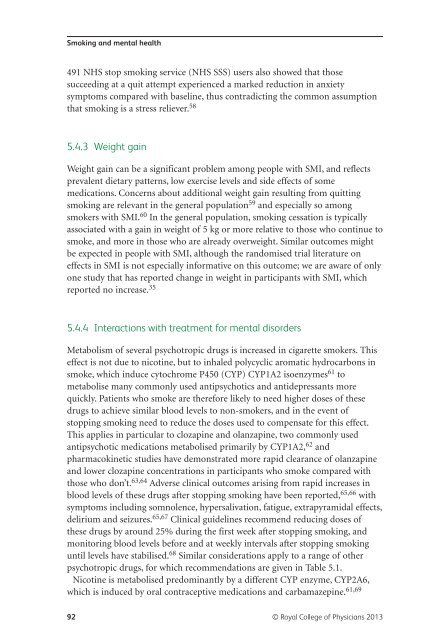Smoking and mental health - NCSCT
Smoking and mental health - NCSCT
Smoking and mental health - NCSCT
Create successful ePaper yourself
Turn your PDF publications into a flip-book with our unique Google optimized e-Paper software.
<strong>Smoking</strong> <strong>and</strong> <strong>mental</strong> <strong>health</strong><br />
491 NHS stop smoking service (NHS SSS) users also showed that those<br />
succeeding at a quit attempt experienced a marked reduction in anxiety<br />
symptoms compared with baseline, thus contradicting the common assumption<br />
that smoking is a stress reliever. 58<br />
5.4.3 Weight gain<br />
Weight gain can be a significant problem among people with SMI, <strong>and</strong> reflects<br />
prevalent dietary patterns, low exercise levels <strong>and</strong> side effects of some<br />
medications. Concerns about additional weight gain resulting from quitting<br />
smoking are relevant in the general population 59 <strong>and</strong> especially so among<br />
smokers with SMI. 60 In the general population, smoking cessation is typically<br />
associated with a gain in weight of 5 kg or more relative to those who continue to<br />
smoke, <strong>and</strong> more in those who are already overweight. Similar outcomes might<br />
be expected in people with SMI, although the r<strong>and</strong>omised trial literature on<br />
effects in SMI is not especially informative on this outcome; we are aware of only<br />
one study that has reported change in weight in participants with SMI, which<br />
reported no increase. 35<br />
5.4.4 Interactions with treatment for <strong>mental</strong> disorders<br />
Metabolism of several psychotropic drugs is increased in cigarette smokers. This<br />
effect is not due to nicotine, but to inhaled polycyclic aromatic hydrocarbons in<br />
smoke, which induce cytochrome P450 (CYP) CYP1A2 isoenzymes 61 to<br />
metabolise many commonly used antipsychotics <strong>and</strong> antidepressants more<br />
quickly. Patients who smoke are therefore likely to need higher doses of these<br />
drugs to achieve similar blood levels to non-smokers, <strong>and</strong> in the event of<br />
stopping smoking need to reduce the doses used to compensate for this effect.<br />
This applies in particular to clozapine <strong>and</strong> olanzapine, two commonly used<br />
antipsychotic medications metabolised primarily by CYP1A2, 62 <strong>and</strong><br />
pharmacokinetic studies have demonstrated more rapid clearance of olanzapine<br />
<strong>and</strong> lower clozapine concentrations in participants who smoke compared with<br />
those who don’t. 63,64 Adverse clinical outcomes arising from rapid increases in<br />
blood levels of these drugs after stopping smoking have been reported, 65,66 with<br />
symptoms including somnolence, hypersalivation, fatigue, extrapyramidal effects,<br />
delirium <strong>and</strong> seizures. 65,67 Clinical guidelines recommend reducing doses of<br />
these drugs by around 25% during the first week after stopping smoking, <strong>and</strong><br />
monitoring blood levels before <strong>and</strong> at weekly intervals after stopping smoking<br />
until levels have stabilised. 68 Similar considerations apply to a range of other<br />
psychotropic drugs, for which recommendations are given in Table 5.1.<br />
Nicotine is metabolised predominantly by a different CYP enzyme, CYP2A6,<br />
which is induced by oral contraceptive medications <strong>and</strong> carbamazepine. 61,69<br />
92 © Royal College of Physicians 2013














